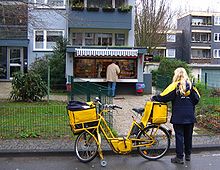Mail carrier
![]()
Postbote is a redirect to this article. For other meanings, see Postman (disambiguation).
![]()
This article or paragraph presents the situation in Germany. Help describe the situation in other countries.
![]()
This article is not sufficiently supported by evidence (e.g., anecdotal evidence). Information without sufficient evidence may be removed soon. Please help Wikipedia by researching the information and adding good evidence.
Delivery person refers to a specialist for letter delivery, courier, express and other postal services. Deutsche Post AG calls them deliverers for letter and group delivery. Other terms are letter and parcel deliverer, parcel carrier, postman or postman. In Austria and southern Germany, the term postman is common, and in Switzerland, Pöstler.
Deutsche Post employs 80,001 delivery staff for 54,200 delivery districts in Germany, who distribute around 71 million letters per day to 43 million German households (as of 2007). In addition to Deutsche Post, several nationwide and numerous regional postal service providers are also active in Germany.
Distributors of advertising leaflets, daily and weekly newspapers and subscribed magazines to households are also referred to as delivery agents in the broader sense.

Delivery woman of the Deutsche Post AG with bicycle (2007)
History
In the past, the postman was predominantly an official of the postal authority. As a rule, he wore a uniform while on duty. Today (or for some years now) they are usually employed by a logistics or postal company.
Since the relaxation of the letter monopoly, newspaper publishers have increasingly tried to use their experience with exclusive newspaper delivery services for print media for letter delivery in their circulation area.
Delivery staff can also be employed as money postmen.
Since 1999, Deutsche Post AG has cut about 33,500 full-time jobs, while all new mail service providers together (2007) employ about 45,000 people, mostly as mini-jobbers. The Post fears losing up to 32,000 more jobs, while more and more (especially small) private companies in Germany are paying "piece rates" - i.e. no wages at all, depending on the volume of work. Since the partial opening of the postal monopoly in Germany in 1998, the responsible Federal Network Agency has awarded around 1000 licences. It examined the working and wage conditions of the "new letter service providers" until the end of 2007.
The letter monopoly finally expired at the end of 2007. The Ver.di trade union reached an agreement with Deutsche Post on a minimum wage of 9.80 euros per hour for letter delivery staff in the west and 9 euros in the east.

Postman with letters and parcels 1946 in Berlin
Parcel Carrier Protection Act
The Parcel Carrier Protection Act of 15 November 2019 will prevent the circumvention of workers' rights. Companies will be held more accountable and subcontractor liability will also be introduced in this industry. It makes those who subcontract to other companies responsible for ensuring that sufficient working conditions prevail and social security contributions are paid correctly. Fair competition in the parcel sector will also be ensured.
Search within the encyclopedia